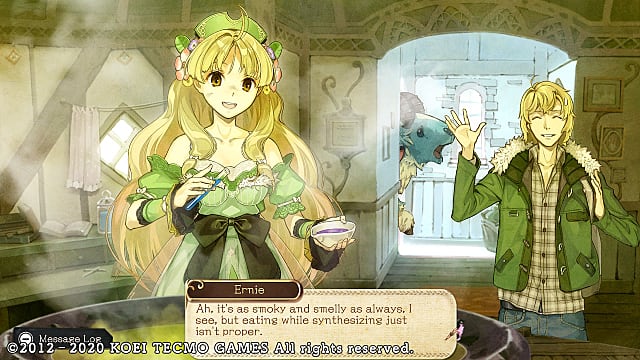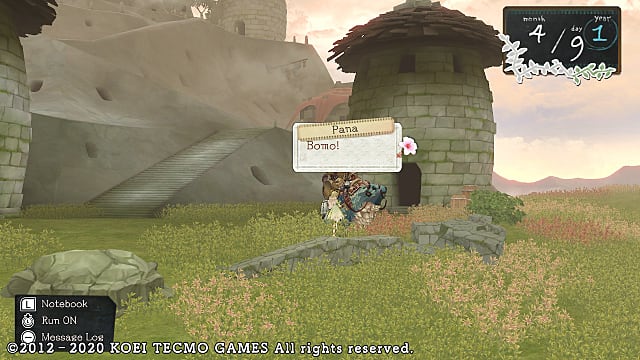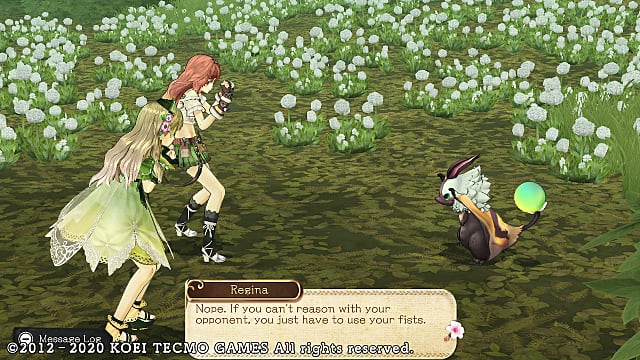

Koei Tecmo recently released the Atelier Dusk Trilogy, and we're breaking down our impressions of each entry in the collection. This review focuses on Atelier Ayesha, but be sure to can check out our Atelier Escha & Logy DX and Atelier Shallie DX reviews too.
Atelier Ayesha: The Alchemist of Dusk follows young apothecary — or pharmacist, depending on the localizer (more about that later) — Ayesha Altugle as she searches for her sister Nio. Of course, Nio isn't really dead. Ayesha can save her sister's spirit and bring her back to life with the power of alchemy.
Crafting items is a fairly simple premise that's surprisingly addictive, and silly as it might sound, the story actually works pretty well. Ayesha also improves a lot of things from the Arland trilogy that preceded it, though it does stumble in a few places.
Atelier Ayesha DX Review — Lighting Up the Dusk
If you're coming to this right after playing the Arland games, you'll probably notice Atelier Ayesha is set up much like Atelier Totori. The emphasis is on adventuring, as Ayesha learns about alchemy to uncover the secrets behind her sister's disappearance. The world map is, accordingly, gigantic, with tons of places to visit. These range from gathering spots, caves, fields, and mountains, to multiple — sometimes haunted — towns.
One hallmark of the Dusk trilogy is that the time limits are much more relaxed than those in the Arland games. You get three years to help Ayesha accomplish her mission, with some special traveling methods that cut down on time later.

There is a slight trade-off, though. Venturing to new areas within a specific spot — like a new screen in a cave series, for example — no longer takes multiple days. Instead, gathering items takes time. Initially, filching things from three gathering spots equates to an in-game day, though you do acquire skills later on that help reduce the amount of time gathering takes.
Strict time limits were a feature in previous games and added a sense of urgency to conceivably relaxed proceedings. Ayesha might handle time differently in many ways, but its laxity is actually a bit deceptive.
Because you don't have many reminders about urgent story quests, and because many side quests have loose time limits, it's easy to get caught up in other things and not advance the story. While you do have time to piddle away, it's still highly recommended you balance exploration, synthesis, and questing, lest you find you can't complete certain tasks, or that you might miss out on maximizing friendship levels with your co-adventurers.
The open-ended nature of Ayesha's journey and the relative freedom you get in completing tasks is a perfect complement to the game's story. Each new recipe learned or area explored feels like a sign of progress, which is very important in a game that could easily become too mundane to enjoy.
That said, the requirements for unlocking new areas could be a bit easier to find. They're stuffed in a menu full of other tasks, labeled as "Travel" tasks, both easy to miss and annoying to sift through.

Completing sidequests and requests is important for gaining memory points as well. These are a feature only in Ayesha and provide short journal entries, along with the more practical stat or skill enhancements. You'll gain memory points for other things as well, like exploring or gathering, and it's a very good incentive to do as much as possible when you can.
One other big change in Ayesha is the combat, which is some of the best in the series. It combines the support system introduced in Rorona with some interesting movement-based mechanics as well, where you get an attack boost if you're positioned behind an enemy.
Ayesha uses her staff and items, rather than special skills, so you'll definitely need to spend some time on crafting attack and healing items to make her useful. While it might make MP seem redundant, some higher-level items require MP.
And as the game wears on, you'll need higher-level items. Combat was sort of a throwaway thing in the Arland games unless you sought out high-level monsters, but Ayesha mixes in more dangerous foes with the usual fodder. That, combined with low-ish HP for most of your early-game characters, means even Normal mode offers some challenge.
Finally: synthesis. Ayesha and the Dusk trilogy, in general, give you a lot more freedom in synthesizing, while adding more components to play around with. Stacking traits was the biggest draw in the Arland games. Here, traits and effects change depending on the order you add each item, and you gain a wealth of different skills that can amplify or absorb effects for even greater benefits. Synthesizing in Ayesha is always a pleasure and never the chore something like making wax sticks for a village kid should be.

Despite the adventuring focus, Atelier Ayesha still has plenty of the slice-of-life elements the modern Atelier games are known for. It's not long before Ayesha gets joined by an eclectic bunch of friends and colleagues. They all have unique character and quest events unlocked as you raise their friendship levels, and you'll get different endings depending on how you manage your friendships and questing, among other things.
The only downside here is that these friends and companions tend to overshadow Ayesha herself. She's likeable, and she grows throughout the journey, but she's definitely not the strongest protagonist in the series. She doesn't get as much internal dialogue as other protagonists, so perhaps Gust thought the memory point entries were enough here — but they aren't.
It isn't helped by some rather iffy voice acting either, and that applies to the other cast. I don't like criticizing voice actors since they aren't always responsible for the outcome, but the English work here just doesn't fit the game most of the time. The script itself is often awkward too, with plenty of areas that seem like they were translated too literally, and it's a bit disappointing it didn't get cleaned up for the re-release.
Something else that wasn't touched up for the re-release is the performance. Atelier Ayesha Plus on the Vita struggled in many of the bigger areas, and you'll still see stuttering framerates in the DX version.
Atelier Ayesha DX: The Bottom Line
Pros
- Addictive gameplay loop
- Tons of content
- Good integration of gameplay concepts and narrative setup
- Fun side cast
- Big improvements in crafting over the previous trilogy
Cons
- Wonky localization in places
- No improvements to the Plus version's performance issues
- Ayesha's a bit meh as a protagonist
Overall, Atelier Ayesha DX is a great entry in the series whether you're new to it or just finding it now. It might not be the most polished, but it has an excellent atmosphere, integrates story and gameplay surprisingly well, and offers a compelling and addictive synthesis system.
[Note: A copy of Atelier Dusk Trilogy was provided by Koei Tecmo for the purpose of this review.]
0 comments:
Post a Comment